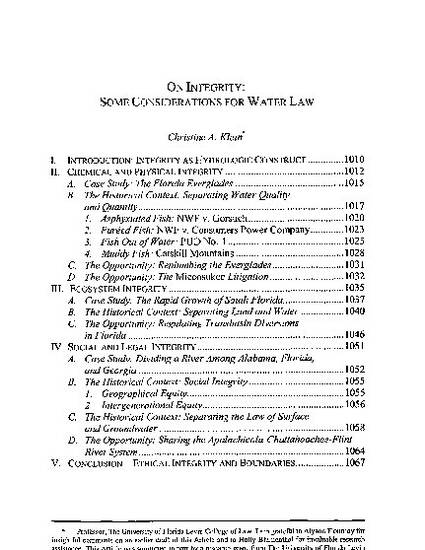
Expanding upon the aspects of integrity protected under the Clean Water Act, this Article will explore the relevance to water law of chemical,physical, ecosystem, social, and ethical integrity. Just as the Clean Water Act intended to prevent unacceptable "perturbations" of ecosystems, so also this Article will consider the extent to which the law itself may work an unacceptable perturbation of fundamental hydrologic and social principles. In many instances, water policy compartmentalizes the law in ways that have little to do with hydrologic reality and in ways that are antithetical to wholeness and integrity. Examples include the legal bifurcation of surface and groundwater, quantity and quality, land and water, and the present and the future. Conversely, integrity-destroying policies may find legal support in arguments that are deceptively integral and holistic in tone. For example, Florida Everglades litigants opposed the regulation of phosphorous pollution under the guise of an argument styled the "unitary waters" theory.
This Article views three contemporary water disputes through the lens of hydrologic integrity. Case studies include the massive program to restore the Florida Everglades; proposals for north-south water transfers in Florida, evocative of the centuries-long dispute between northern and southern California; and the struggle to apportion a three-state river system among competing users as diverse as sprawling Atlanta and the sleepy oyster town of Apalachicola, Florida. Surprisingly, perhaps, all three case studies focus upon Florida, a state that enjoys an average annual rainfall of about 54 inches. The fact that not even a water-rich eastern state is immune from water controversies of national significance underscores the pressing need to ensure that water law reflects principles of hydrologic reality, fairness, and integrity.
